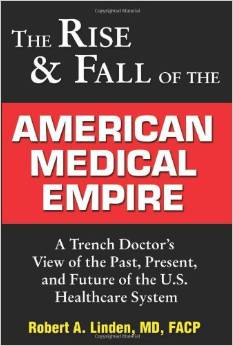All posts by agitsch
Setting the stage for DPC

Here is an interview from my Surviving Healthcare podcast. It is a story about the loss of relationship between patients and physicians. This conversation is one that set me on a journey to find workable solutions to improve healthcare for patients and physicians.
Here is some background:
My guest, Dr. Robert A. Linden, has been a practicing physician for more than three decades as an internist whose specialty is geriatrics, and he wrote a book entitled The Rise and Fall of the American Medical Empire, which deals with the medical industry and its changing role in the overall economy.
Dr. Linden and I talk about the concept of “American medical empire” and how it has transformed the healthcare system from a professional model run by medical professionals into a corporate model that is more concerned with profit. We discuss the frustration felt by traditional physicians like Dr. Linden, who lists the four biggest problems he sees with healthcare delivery these days. They are:
- Death of primary care
- Health care reform and insurance
- Big Pharma
- Medical malpractice
We discuss how the proliferation of insurance reduced the knowledge level of the average patient and effectively took them out of the equation. Dr. Linden explains how we overuse specialists and sub-specialists, and laments the loss of what used to be a special patient-physician relationship.
He then explains how the healthcare system’s shift from a doctor-centric medical system to a business model has led to problems that are all detrimental. Dr. Linden suggests that we get back to “captain of the ship” and continuity of care concepts in order to make the system better.
Enjoy!
P.S. - If you want to skip the introduction, go directly to location 2:00
Click here to listen in a new window
The future of medicine doesn’t include the doctor patient relationship

Really?
I’ve always believed the bedrock of medicine is the relationship between a patient and their physician. It is the essence of medicine, to help another.
Yet, I was shocked when I saw the words of advice to medical students by Dr Sachin Jain:
“The simple image of the physician-patient relationship that draws many of us to medicine—the dedicated physician, the thankful patient—is no longer.
It has been replaced instead by one in which the patient is at the center—and the physician is part of a broader team managing the health not just of one patient at a time, but of whole populations.”
Yes, healthcare is changing because of the system’s failure. But to discard the very root of medicine appears unwise, if not foolish.
Today medicine focuses on population health not individual health. It worries me because this focus on populations and “the greater good” historically comes at the expense of individuals. (Remember Stalin’s take: One death is a tragedy, a million deaths is a statistic)
Medicine takes place at the individual level.
The humanity of medicine is in the doctor patient relationship. The caring, sharing, and interventions happen one patient at a time. If you take that out of our healthcare system, you end up with an expensive, bureaucratic biological repair shop.
Will the doctors and nurses in the hospital act like the employees of your local DMV?
Do they already? Hopefully not.
Now you may disregard what I say because I am not a physician like Dr. Jain. But there are numerous physicians that believe the doctor patient relationship is vital to medicine.
Dr. Venu Julapalli [at video location 2:34] says it perfectly:
“[Medicine] It’s all become population based. And all that’s important. But really when it gets down to it, what is that person needing right there in that moment. What’s the unique situation? And how can I meet that in that moment, right there and then. That’s the healing relationship. Two unique human beings that can’t be distilled down into some cook book medicine.”
I pray that Dr. Jain is wrong about the future of the patient doctor relationship.
The last hope for this important relationship is the DPC movement. It’s stunning that the innovation of DPC is the direct relationship between a patient and their physician. With all the advances in technology, it should be easier than ever for patients and physicians to communicate. But it’s not.
Medicine should be broken up.
It’s big business. Keep the expensive stuff in the hospitals and ASCs. This is where you need insurance (and how it was originally designed). And outside of insurance networks and payments, let patients find a DPC physician that they can have a real, personal relationship with.
Personalized medicine is already here. Give patients and physicians time to develop a real relationship.
Hopefully Dr. Jain and other planners can listen to Dr. Julapalli and other clinicians, to see the benefit of keeping that relic of medicine, the physician-patient relationship, intact while they plot the future of healthcare in this country.
Who hates DPC the most?

We all know our healthcare system is a failure. The current system does not benefit either of the primary groups at the root of healthcare: the doctors or the patients. It gets worse and worse for these two every single year, even before Obamacare.
There is a solution to our healthcare failure right now.
At this very moment.
It’s called DPC, or you might hear it called direct primary care.
What is it you say? It’s revolutionary!
It’s so old, it’s new again. The DPC solution is: let doctors and patients have a real relationship. DPC gives them time to get to know each other. Crazy idea, right?
But…but…it won’t work.
Riiigggghhhhtttttt. Like it hasn’t worked for hundreds of years.
But, let’s see who these naysayers are, shall we?
Let’s look at the insurance companies. The villains of the healthcare system, those greedy bastards. Isn’t that the thought? Is it because they deal with money, or is it because they charge so much for such little value? They got the government to insure mandatory consumption coverage. They make everyone’s life miserable, including their own. All the paperwork, the fine print, the coding, the compliance, and waiting weeks to get paid for services already rendered IS draining.
Yet, insurance companies like spending less and keeping more of the money. They have forced consumption so anything they can do to get those fat, sloppy, diabetic, hypertensive, arthritic, depressed, paranoid, pill popping Americans not to file a claim—the better!
There are several insurance companies that are experimenting with the DPC model (crazy, right?). They find that DPC saves them money. It also helps patients, nice right? Yep.
Insurance companies like DPC. They just don’t know how to use it yet. They don’t know how to control it. They will try to create their own standards and best practices (physicians beware).
So, I don’t think insurance companies really hate DPC. They are figuring out a way to incorporate into their current cartel scheme.
What about the government and DPC?
I say, “What about it?” If the insurance companies like it, they have some clout with Uncle Sam to let DPC enter as a solution. But so do the pharmaceutical companies, surely they won’t like their government protected price gouging scheme getting altered.
Americans pay more for their drugs than any other country in the world. This financial burden adds to the stress patients have to deal with. So why wouldn’t pharmaceutical companies like DPC? DPC physicians work as advocates for their patients.
DPC’s seek, find, and negotiate prescription (and other medical services) prices for their patients. This is because physicians are there to help their patients in body, mind, and spirit. Lower drug prices are a relief to patients, even if you could afford more. Why don’t other doctors look to lower prices for their patients? Unfortunately, the standard physician response is: “That’s not my job”. The pharmaceutical companies probably won’t like DPC because it will decrease their protected high margins.
The hospitals won’t like DPC either. Hospitals know transparency will kill them. I mean, why get stitches for nothing with a DPC monthly membership when your alternative is to go to the ER? There you will get an $8 aspirin while waiting to get x-rays and possibly a CT because the hospital administration doesn’t want a lawsuit. Oh and let’s not forget about the hospitalist’s time to sew you up after hours of waiting around and filling out paperwork.
No, hospitals won’t like DPC. An independent patient router (a DPC) instead of a contractually obligated employee (PCP) might just advise their patients to come into their office for those stitches rather than sending them to an expensive hospital.
So let’s tally up the scorecard quickly. The government has a 2:1 leaning (Pharma & hospitals vs insurance carriers) towards hatred of DPC and trying to kill it with regulations or legislation. What other groups does our government listen too?
Medical device companies.
We are good at medical innovation in the US. That is a highlight of our system. The medical device companies may or may not like it. I think it would depend on their product.
If it is big, expensive, and geared towards the hospital/drug side of healthcare, then it’s a good assumption those companies will not like DPC. If the medical device company faces toward patients and (D)PCs, and has transparent value, then let’s assume they will be in favor of DPC. So we’ll call it a draw within the medical device companies. If you don’t like their neutral count, consider them too small a lobby by themselves to get a full count at this table.
If they are too small, let’s back up and look at how US business will view DPC. I think most of them will like DPC. Heck, if you can lower their healthcare costs with less regulations, I believe you can confidently say they support DPC.
But why would businesses like DPC?
Simple.
DPC can help get their healthcare costs under control. How? The business can increase their deductible so that their insurance premiums go down. Then, the business would self-insure a large chuck of the high deductible for their staff. There are several ways to accomplish this self-insuring, but we aren’t going to get hung up on that now.
Then the business contracts directly with a DPC physician for their employees. With a full service DPC physician, the business’ employees can get the majority of their needs met without paying anything out of pocket or having to pay deductible costs.
Ok, ok, ok. I hear some of the doubters talking about prescription costs and surgeries. Yes, employees would still have drug and surgery costs. However, their DPC physician should be able to locate the lowest possible prices for their drugs and assist in finding the best value for her surgery. Why? Because part of a DPC physician’s role is to be an advocate for their patients and assist them in navigating the complex cartel system.
Obviously a DPC physician would be better able to determine the medical quality of a surgeon/surgery center than an employee without any medical training. So the DPC physician can discuss the price and medical quality of an employee’s potential surgery, giving the employee confidence about their decision.
Let’s be clear about who makes a business’s healthcare decisions. The higher management is going to make the call. And I believe they are smart enough to see (if the options are out there for them) that reducing their total healthcare costs and possibly helping their staff is a clear win over continually getting double digit premium increases year after year AND getting less coverage. Wouldn’t you agree?
So we have a 2:2 tie in the government support of DPC with pharmaceutical companies and hospitals hating DPC. While this tie might persist, one of the voices in this discussion that will be called upon to give their expert opinion are physicians themselves.
The most insidious group that hates DPC are not hospitals and pharmaceutical companies but physicians themselves.
No, not the physicians that are DPC physicians. You must remember that physicians are not a homogeneous group. If they were, they never would have allowed insurance companies to dominate their profession.
No, the physicians that hate the DPC model are the ones that are in the hospitals or that profit from the current system set-up. The ones that get paid big bucks for PCP’s to refer to them for some service.
It blows my mind that one of the biggest knocks on DPC is patient abandonment. Really? These critics make the assumption that it is better to have more patients get substandard care, longer waits, and no relationship with their physician. This is because there is a shortage of physicians (no kidding, who in their right mind would want to work in such a mess?).
It must be that DPC critics prefer patients wait forever to see a physician for 5 minutes, during which time that physician is looking into their computer and not into the eyes of the patient. Critics worry about that? I guess crappy service is better than no service? I don’t agree. Send the abandoned patients to an urgent care center or a hospital. They don’t have a relationship with their physician anyway. Plus, it will help hospitals deal with the DPC solution in the short term too.
These critics forget to factor in the increase in primary care physicians if medical students and current PCPs see the vitality and empowerment of DPC. Show them an alternative worth pursuing. Give primary care back the dignity, respect, and prestige that comes with being a physician that really helps their patients.
DPC is the solution to our healthcare system failure.
When patients start experiencing the difference AND sharing this, then there will be enough demand to overcome the DPC opposition.